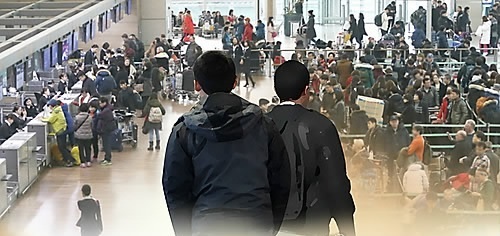Crime-prone foreign nationals banned from entering Korea from April
By KH디지털2Published : March 30, 2017 - 15:27
Foreign nationals perceived as prone to commit acts of terrorism and other crimes will be barred from boarding international flights bound for South Korea, starting next month, the government said Thursday.
The Ministry of Justice said that an advance passenger identification system will formally take effect April 1 to prevent crime-prone foreigners from boarding South Korea-bound planes at overseas airports.

The system will be applied to all flights of 86 airliners that depart for South Korea from 169 airports in 43 countries, the ministry noted. The entry ban has so far been implemented selectively on a trial basis.
Under the system, an airliner sends passenger information from departure airports to the ministry's Immigration Information System. Then the immigration authorities here give real-time feedback on whether to allow boarding for specific individuals after examining their records of involvement in terrorist attacks and previous refusals of entry and verifying their passports.
Preparations for the system began in March 2014 after a Malaysia Airlines plane went missing and the first test run was carried out for an Asiana Airlines flight departing from Japan's Narita International Airport in February 2015.
In the test operation, a total of 2,271 crime-prone foreigners, including those convicted of attempted murder, drug-related crimes and theft, as well as holders of stolen or lost passports, have not been allowed to enter South Korea.
For instance, an Egyptian national convicted of attempted murder was barred from boarding a Cathay Pacific flight bound for South Korea at Hong Kong International Airport in October last year, while a Vietnamese national wanted by Interpol was not allowed to board a Korean Air plane in Hong Kong in January this year.
"The government will further strengthen border controls and contribute to national security by blocking entry to crime-prone foreigners," a ministry official said. (Yonhap)




![[Herald Interview] 'Amid aging population, Korea to invite more young professionals from overseas'](http://res.heraldm.com/phpwas/restmb_idxmake.php?idx=644&simg=/content/image/2024/04/24/20240424050844_0.jpg&u=20240424200058)











![[KH Explains] Korean shipbuilding stocks rally: Real growth or bubble?](http://res.heraldm.com/phpwas/restmb_idxmake.php?idx=652&simg=/content/image/2024/04/25/20240425050656_0.jpg&u=)

